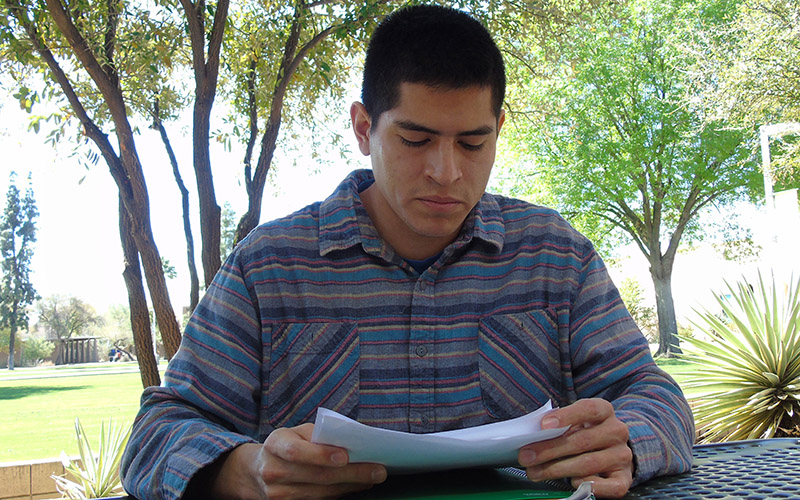
Jacobo Perez, 25, moved a lot as a child. At 12, he settled in Arizona and has lived in Mesa ever since. He’s in his second year studying English at Mesa Community College. (Photo by Leah Goldberg/Cronkite News)
PHOENIX – “How to Cross the Border Illegally or How to Make Tamales de Rajas” is an original poem about border-crossers and the stories they rarely get a chance to tell.
“Usually when I hear in the news that they are criticizing people that cross the border, they just say it like it is something that can be done easily and that always goes right,” said poet Jacobo Perez, who’s studying English at Mesa Community College. “But that’s not true. Just like a recipe, it may not always go right.”
Every year, the Maricopa Community College District has a creative writing competition for its 10 community colleges. Students compete for monetary prizes, and top winners move on to a national event, the League for Innovation in the Community College’s National Student Literary Competition. Categories are fiction, one-act play, poetry and essay.
Perez, who’s in his second year at MCC, won first place in the poetry category during the fall 2017 semester. His poem is about seven minutes long when read aloud and points to the complexity of immigration, including the Border Patrol, coyotes, the separation of families and the physical dangers of crossing the forbidding terrain along the U.S-Mexico border.
The characters and anecdotes in the poem include a mother talking to a coyote – a Mexican national who’s paid to sneak immigrants into the U.S. – border-crossers young and old, a U.S. Customs and Border Protection agent, and the devil.
Perez uses Satan to separate the anecdotes with narrations in which he tells readers how to make a traditional Mexican dish, tamales de rajas.
“He tells you at the beginning of the paragraphs what to actually do,” Perez said. “Then, at the end of the sentences, there is the way in which recipes go wrong, to the way in which illegal immigrants don’t get to their goals.”
The tamales represent immigrants crossing the border and the hardships they endure, Perez said.
Even if readers know nothing about making tamales, they realize this recipe isn’t being followed correctly. The devil insists on drowning the tamales in the beginning; burns his hands in the process; and ensures the tamales are smoked, hard and dry in the end.
Perez said the inspiration for this poem comes from today’s immigration politics, the DREAMers, hearing stories of people crossing the border, immigrant children with undocumented parents who help support the family, and the book “Pilgrims in Aztlan,” by Miguel Mendez.
His mother and father traveled from Mexico to the U.S. and briefly settled in Minnesota, where Perez was born. He eventually left the U.S. with his parents and brother to move to Chihuahua, Mexico, where he grew up.
When he was 12, Perez’s mother told him and his brother they were going to visit their aunt and other extended family in Arizona. She sent them to Mesa, intending for them to stay permanently – something the boys did not know at the time. Perez, now 25, hasn’t seen his mother since 2005.
Perez specifically likes the deserts and libraries in metro Phoenix, elements often present in his writing.
Sean Nevin, program director of the Masters in Fine Arts in Poetry at Drew University in Madison, New Jersey, was the judge in this poetry competition. He said the overall “quality of work really was fantastic. There is some good writing going on in Maricopa County.”
Asked for his thoughts on Perez’s poem, Nevin said he noticed the “long lines, bits of dialogue and (how the poem) is a sort of magical recipe, catalogue, instruction poem.”
In judging poems, Nevin said he looks for those that consistently stick out to him. There were more “technically sound poems in this batch,” he said, with Perez’s poem in particular “kind of furious and flawed but absolutely essential.”
Josh Rathkamp, the director of the creative writing program at Mesa Community College and Perez’s former writing professor, said Maricopa Community College students have consistently placed in the League for Innovation competition in multiple categories for the past decade.
Rathkamp said Perez didn’t need much direction as a writer because “he came into class so talented already.”
He said he was impressed by Perez’s ability to tackle current and difficult subjects, while the “attention to language and imagery makes his poetry stand out.”
The poem includes some curse words and uncomfortable language when the devil refers to border crossers as illegals and wetbacks. But Rathkamp said Perez’s work demands this type of language because it is “an artist’s job to confront what is happening in the world in whatever way is important to the artist.”
“In a world with so much racism and bigotry,” Rathkamp said, “how do you not highlight or talk about it? Why do we have to be nice about it? How do we not use their language and throw it back at them?”
Perez and his poem will move on to the League for Innovation competition, where he will compete against community college students from all over the country.
Follow us on Twitter.